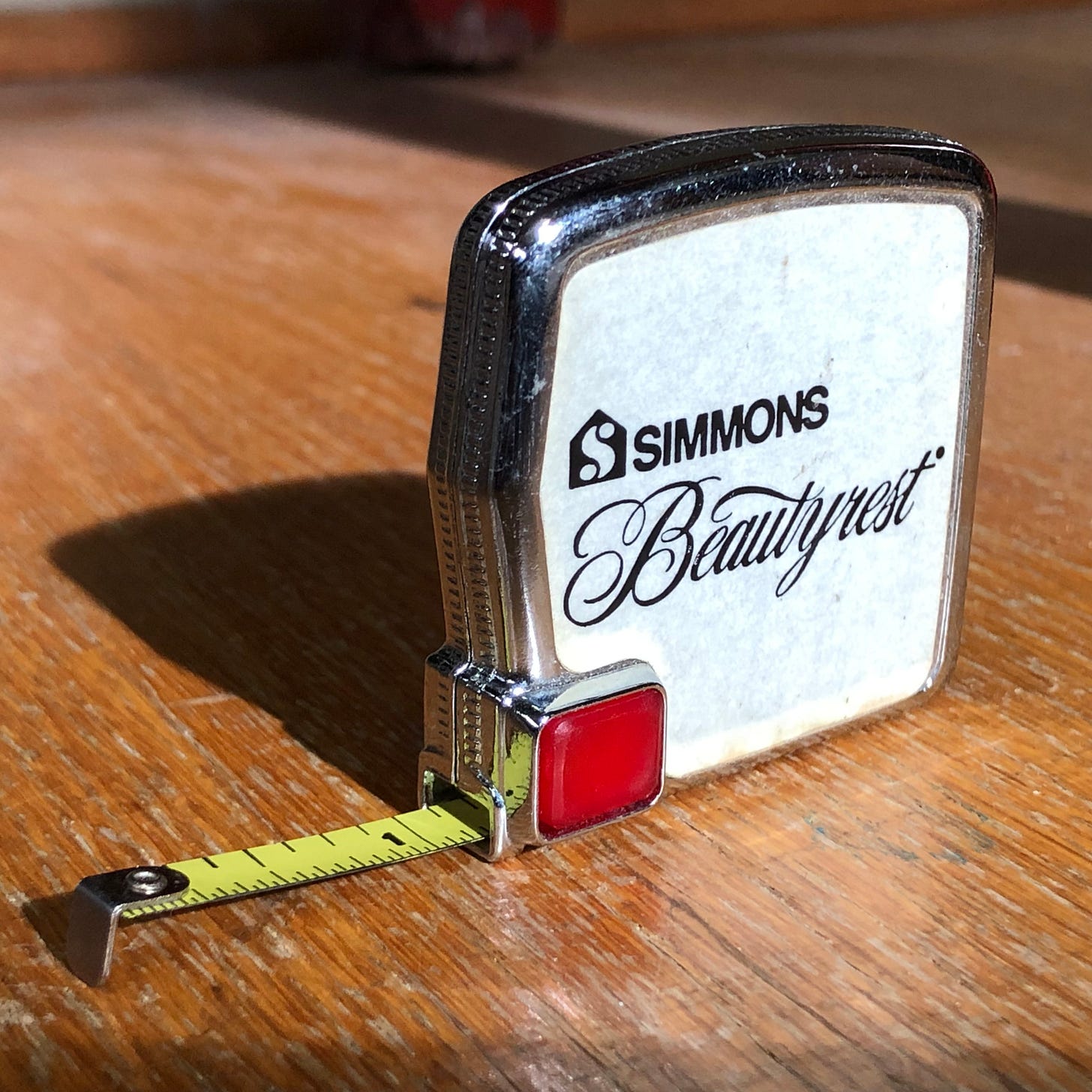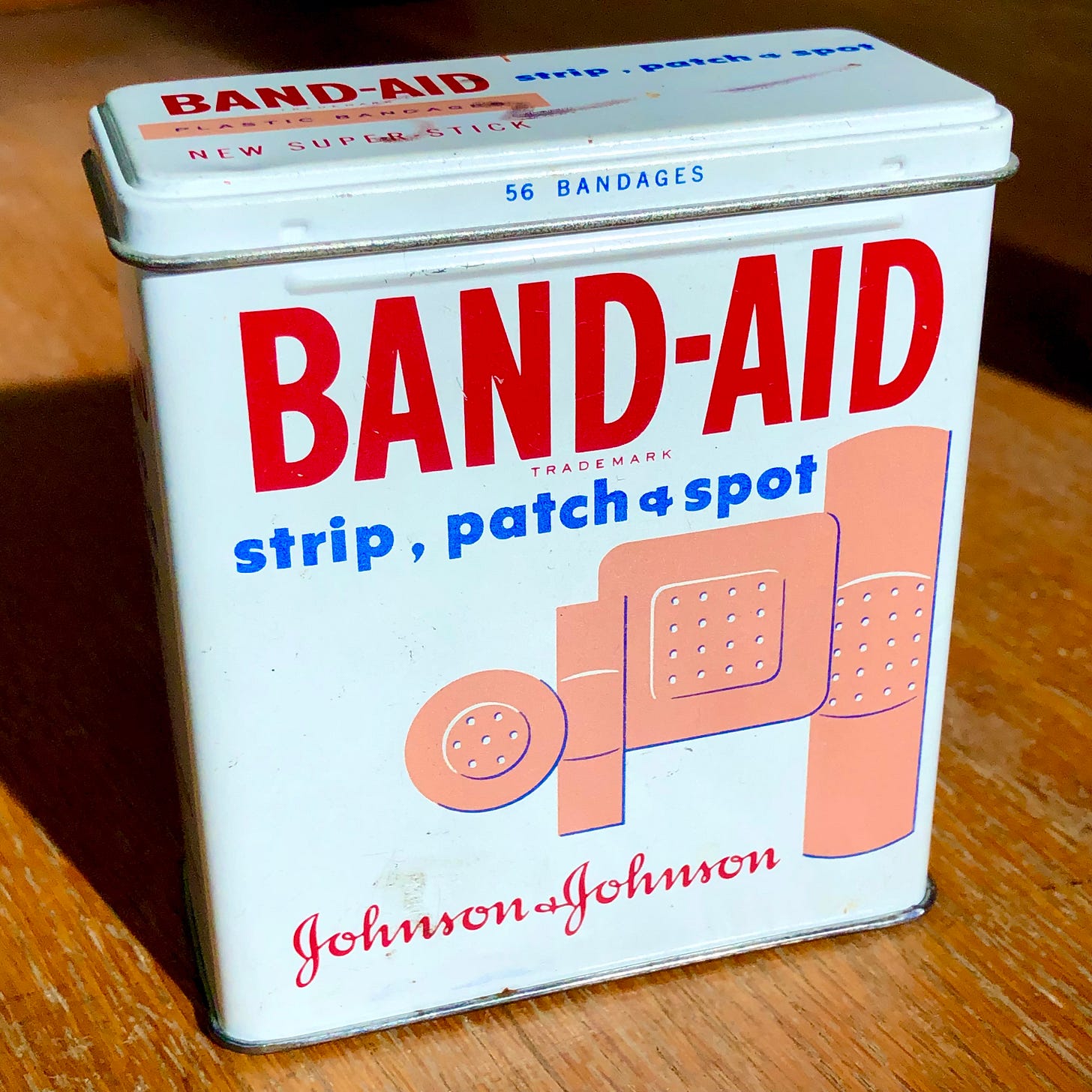Souls never touch their objects. An innavigable sea washes with silent waves between us and the things we aim at and converse with. —Ralph Waldo Emerson
I woke at 2 a.m. Someone was banging on my door, pleading with me to open up.
“I think it’s Rob,” my wife said. “Don’t open it.”
It was Rob. In some sort of crisis, something about losing one of his storage rooms. He was incoherent, in a panic, like the Gestapo was on his tail. He handed me a blue metal box.
“Keep this,” he said, “until I come for it. Promise.”
“I promise.”
In the morning I opened the box. I wanted to know what I was being asked to protect.
It was just junk, odd stuff: a tape measure, a rabbit’s foot, an old can-opener, five 20 dollar bills, a change purse full of quarters, a box of bandaids, an eye-glass repair kit, several old keys, a can opener, stamps, a pad full of I Ching notations.
It held nothing important or valuable, but I put the box on my shelf, and I kept it—for 35 years.
I first met Rob when I lived in Chicago. I was sitting on the curb outside my apartment house, and he came up behind me, out of the alley.
“I’ll give you ten bucks if you help me move a refrigerator,” he said.
He was old, balding, rail-thin, a long gray beard hanging to his belt. He wore a dirty white shirt with a pen guard. Gray pants. Thick, grey plastic glasses, held together with black electrical tape, teetered on the bridge of his nose. He looked like an old nerd who’d just crawled out of a dumpster.
He opened a cheap plastic wallet.
“You don’t have to pay me,” I said.
I was poor but not poor enough to hire myself out to a homeless guy. Well, somewhat homeless. I got my first glimpse of his place when we moved the refrigerator, which he had rescued from a nearby dumpster.
Rob lived illegally in the basement of the apartment house next door. The owner let him stay in this underground hole in exchange for maintenance work.
The space was crowded with tables full of crippled appliances: toasters, clock radios, coffee makers, mixers, blenders, small TVs, microwaves, irons, kettles, telephones, turn tables, speakers, lamps—all neatly arranged in rows.
In a far corner, high off the ground, Rob had built a tight little bed and hidden it within three, floor-to-ceiling bookshelves. A slot between two of the shelves allowed me to peek in.
The shelves were chock full of technical books: textbooks on electronics, user manuals for old appliances, and out-dated catalogues for electronic parts.
Such was my introduction to Rob’s strange occupation.
Other than his maintenance work, Rob didn’t have a job. Instead, he wandered the back alleys of our Roger’s Park neighborhood, digging through the dumpsters in search of broken appliances.
When he found one that was salvageable, he brought it back to his processing center, opened it up, found the problem, scoured his manuals and catalogues, found the part numbers of the pieces it needed, and then—he boxed the thing.
He didn’t fix it.
On a piece of masking tape, he wrote the name of the appliance, the manufacturer’s name, the year it was made, and the number of the part it needed. He slapped the tape on the box, then ran it over to one of the units he rented in storage facilities throughout the neighborhood. How he paid for the rental units was a mystery.
“When the whole thing collapses,” Rob said, “someone is going to need this stuff.”
Rob was a pack-rat with a mission, a junkman of the Apocalypse, patiently building his inventory of salvaged electronics for the survivors of the coming Deluge.
Except for his one ruling passion—to collect, box, and save against the Last Days—Rob was not crazy. We had all sorts of normal, rational conversations.
When a toaster of mine broke, I went on a mad rant against mass-produced junk made to break. With the calm of an electrical engineer Rob asked: “What is your experience with the toaster?”
I didn’t appreciate the feelings moving beneath his obsession until I accompanied Rob to one of his storage rooms.
It was a furious Chicago winter. Cold as knives. Being outside was impossible; the air hurt. But Rob came knocking and asked if I would come with him. He had something he wanted to show me.
I followed him several blocks through the snow and vindictive wind. When we reached the place, he led me up to the fifth floor, down narrow hallways, until we came to a storage room.
I thought it was his. The door was slightly ajar. Inside was a mattress piled with dirty blankets, three pillows, a bra, plastic grocery bags, a stack of soup cans, a camp stove, and children’s clothes.
At first, I didn’t understand.
“It’s a family,” he said. “They’re living in there.”
They weren’t at home. They must have been scavenging out in the Polar Vortex or warming up at the public library. But I saw them. Clear as crystal. The mother and the two children huddled under the mountain of blankets, socks for gloves, heating a Campbell’s soup can over the stove.
Here were human beings living in a box built for old furniture, a ten-below wind whipping through the chinks in the walls.
“There are seven more rooms like this here,” he said. “Tell me it’s not coming.”
Rob salvaged all those clock radios and electric mixers so that America might rebuild after the Deluge. The family in the storage unit was just a sample of what we all would suffer when Rob’s apocalypse occurred and his crazy mission was revealed to be far-sighted preparation.
Rob’s work on inoperable gadgets—finding the broken part, boxing it, and storing safely—was madness. But after he showed me this storage unit for human beings, it seemed like something closer to love. Every appliance he salvaged was, in his mind, another human being saved.
The heart breaks before the mind cracks.
A look into that storage room was a peek into the desperation of the homeless. Into a mind crazed by human suffering. Into our fantasies of the apocalypse, all those stories of the Big Disaster that will finally make us face reality.
Facing reality.
Most of the time, I am so wrapped up in my own head, so distanced from everything I encounter, that I can hardly call the encounter an experience.
I am alienated by abstractions. At dinner parties, I take a “position” on an “issue” and make an “argument.” I use concepts like “homelessness,” “immigration,” “racial discrimination,” but until I encounter the real thing—see it, taste it, touch it, feel it hurt, like a Chicago winter wind—my argument is always a bit of a pose.
The glorious human tool that allows us to control our world—our words—are shells that keep us from experiencing it.
Sometimes we crash our lives just to break the spell. “There are moods in which we court suffering,” Emerson wrote, “in the hope that here, at least we shall find reality, sharp peaks and edges of truth.”
I kept Rob’s box for 35 years. By that time I figured Rob was dead. I certainly wasn’t obligated to keep, for the remainder of my life, a memory box for a man’s delusions.
A little at a time, I began to raid the box. Some problem would arise, and I would realize that I had just what I needed—inside Rob’s box.
I took the cash first. I needed to pay my HVAC guy for his fall furnace inspection, but I had no time to run to the ATM, and I was out of checks. Then I remembered the five twenties in Rob’s box.
Then I took the small tape measure. I was putting up an art show, and when I couldn’t find mine, I remembered the one in the box. When I kept forgetting change for parking meters, I took the change purse full of quarters.
The can-opener, the box of bandaids, the eye-glass repair kit, some of the stamps—all sooner or later became suddenly useful and necessary. I even found a home for the rabbit’s foot, which I added to a gift for my son.
As I used the items in Rob’s box, I began to suspect that Rob left it with me not because someday he would need it, but because he knew someday I would—that leaving me the box was an elaborate object lesson in being prepared.
Who knows.
What I do know is that I can’t get rid of Rob’s box, even though now it’s empty. There’s something in the box itself I always need to remember.










…wowow…so much here i’m not sure where to start…one of my best friends (rip) was a chicago street musician who used to play the streets…and at one point lived on them…he was nothing if not a mystic and a teacher…there is a whole another society living inside and outside of what we got filled with so much care and wisdom…i used to live in east rogers park…one night i went downtown to see a rerelease of the original alien…it was -10 degrees and my car got towed during the movie…the walk to tow lot was through a four block tent camp underneath the freeway…it never dawned on me that so many might live homeless and arctic…your tale brought me some memories…
Magnificent.